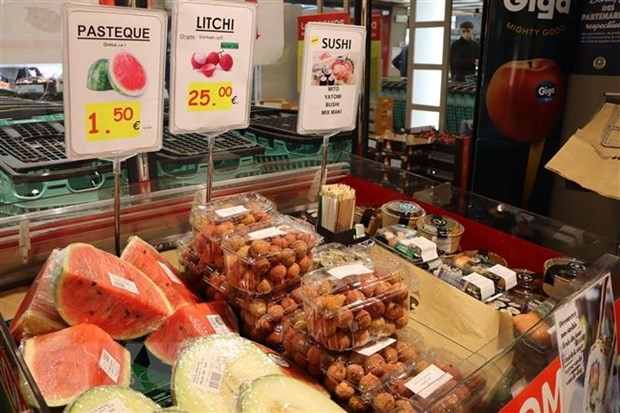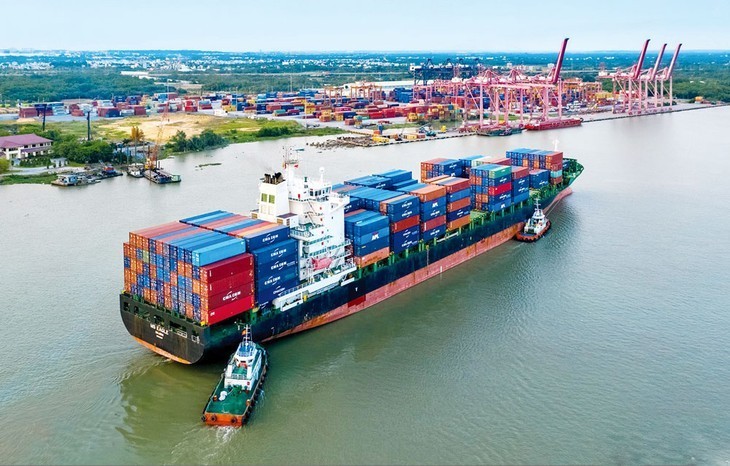
Building brand to obtain a 'passport' in the EU market
Latest
 |
| Vietnamese lychees are on sale at Carrefour Tongres supermarket in Brussels. (Source: TTXVN) |
Vietnamese products are welcome by Europeans
During its 3 years of implementation, the EU-Vietnam Free Trade Agreement (EVFTA) has created great momentum for Vietnam’s export to the EU market. A wide range of products have begun to build Vietnamese brand name, and they are well-received by european consumers.
According to Mr. Ngo Chung Khanh, Deputy Director of the Multilateral Trade Policy Department (Ministry of Industry and Trade), the EVFTA has one of the the highest preferential export turnover. Statistics show that, in the first 6 months of 2023, the export turnover of Vietnam’s agricultural, forestry and fishery to the EU market reached 2.1 billion USD.
The Deputy Director said that: “Over the past 3 years, the EVFTA has created great for Vietnam's export in general, and the export of agricultural and forestry products in particular since a number of export tax lines to this market are eliminated. It helps create a competitive advantage in comparison with other countries’ products that do not have FTAs with the EU. The EVFTA has been creating a "highway" for Vietnamese agricultural products to enter the world’s most demanding market.
The greatest advantage for Vietnamese goods, especially agricultural products, is market access. For many years, the EU has been one of Vietnam's top export markets, with significant trade surpluses. The trade growth between Vietnam and the EU has been steadily increasing over the years, despite the impact of the COVID-19 pandemic.”
Mr. Khanh stated that high-quality rice, particularly fragrant rice, is one of the products highly favored by the EU market. For example, Loc Troi rice under the brand "Com Viet Nam Rice" has successfully entered French supermarket chains, and Vietnamese fresh lychees have reached the Czech Republic and several other EU markets.
Loc Troi Group has established a foundation for direct rice exports under the Vietnamese brand to Europe. n 2022, the company exported nearly 500 tons of "Com Viet Nam Rice" to France, Germany, and the Netherlands.
In addition to traditional agricultural products such as coffee, cashews, pepper, and various forestry and aquatic products, recent years have seen new opportunities for businesses to tap into the advantages of the EVFTA with products like fruits and vegetables. These products have shown remarkable growth, with over 200 million USD in exports to the EU market in 2022, making Vietnam the 59th largest supplier of fruits and vegetables to the EU market.
 |
| Building a brand and private label is not a simple path, businesses need a different strategy and direction. (Source: Dau thau) |
How to build a brand in the EU?
Despite the successes, there is still enormous untapped potential in this market since Vietnamese goods account for less than 2% of the EU market share. While the EU is a market with substantial purchasing power, importing goods worth up to 2.5 trillion USD annually.
Some argue that, the reason behind the lack of competitiveness of Vietnamese’s good in this market is because businesses have not recognized the importance of brand development in the export market.
Vietnamese businesses often focus on increasing productivity and product quality, while the significance of brand development is often neglected. Vietnam is renowned for its global market share in exports of rice, coffee, textiles, and garments, yet these goods are often imported into the EU under other countries' brands.
According to Nguyen Thi Thu Thuy, Deputy Director of the Export Support Center, Trade Promotion Department (Ministry of Industry and Trade), brand building in the EU is not an easy task. Businesses need to take well-planned and strategic steps to establish their brands in the market.
The EU market has stringent regulations and high standards for quality, environment, social responsibility, and labor, etc. Additionally, uniformity in product quality across batches is essential for maintaining a company's reputation with EU importers.
“To boost brand building in the EU market, firrts Vietnamese businesses must research thoroughly, understand its culture, trends, and the market's usage preferences”, Ms. Thuy shared.
Sharing his experience of exporting goods to the European market, Nguyen Duy Thuan, CEO of Loc Troi Group, emphasized that pure exporting, which only involves buying and selling or processing rice without any value added, is unlikely to allow businesses to build a brand in the EU market. Loc Troi's approach is pioneering in establishing a sustainable agricultural value chain in Viet Nam.
Accordingly, with pre-orders, member companies of the Loc Troi Group work together for a large-scale, synchronized producing plan, from cultivation areas planning, suitable seed selection, implementing scientific farming practices, and prioritizing the use of bio-based agricultural materials. This ensures the highest quality and most recent rice products for the market.
Ms. Nguyen Thi Huyen, CEO of Vinasamex, also observed that, in the past, without a brand, exporting to general markets was relatively straightforward. However, in recent years, businesses have shifted their focus towards premium products for export to more demanding markets, such as the EU, Canada, the US, and Japan.
"Building a brand and gaining international certifications is not a simple task, requiring a different strategy. Nevertheless, with a brand and international certification, businesses have a “passport” to increase the added value of their products, sell them at higher prices, and gradually establish the brand on the international market," emphasized Huyen.
According to the CEO, to maximize exports to markets that Vietnam has signed an FTA with, Vinasamex is planning to expand its product range using its own brand. In the near future, Vinasamex will invest in building a standard-compliant factory to expand its product portfolio, producing a number of tea varieties under the brand "Spice Fest" and the brand "Vinasamex" for direct sales to consumers in the US, Canada, and Europe.





















